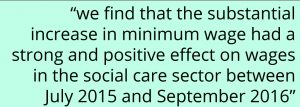February 7, 2018

 By Florin Vadean and Stephen Allan
By Florin Vadean and Stephen Allan
Through the combined increase in the National Minimum Wage rate in October 2015 and the introduction of the National Living Wage in April 2016, workers aged 25 and over paid at minimum wage, had an over 10 percent pay raise. The social care sector in England is a labour intensive, low pay sector, and as such, can be substantially affected by changes in minimum wage legislation. We assessed the effects of this exogenous wage increase on independent social care providers and staff by looking at effects on wages, employment, employment conditions, productivity, and staff stability.
Using data from the National Minimum Data Set for Social Care (NMDS-SC), we find that the substantial increase in minimum wage had a strong and positive  effect on wages in the social care sector between July 2015 and September 2016, with quite substantial compression of the wage distribution at the lower end. Although, as in many other studies, the results show that the effect on employment is not statistically significant, this might be at least partially explained by a negative effect on employment conditions. Everything else equal, both the share of staff paid initially under the new minimum and the initial wage gap (i.e. the average increase in wages needed to bring the staff pay to the mandatory minimum) had a negative effect on employment conditions, as measured by the share of staff on zero-hours contracts.
effect on wages in the social care sector between July 2015 and September 2016, with quite substantial compression of the wage distribution at the lower end. Although, as in many other studies, the results show that the effect on employment is not statistically significant, this might be at least partially explained by a negative effect on employment conditions. Everything else equal, both the share of staff paid initially under the new minimum and the initial wage gap (i.e. the average increase in wages needed to bring the staff pay to the mandatory minimum) had a negative effect on employment conditions, as measured by the share of staff on zero-hours contracts.
In general, as the share of employees on zero-hours contracts in the social care sector decreased during this period, our results show that the minimum wage policy contributed to slowing down the downward trend in employment on zero-hours contracts.
Full paper available at https://www.pssru.ac.uk/pub/5335.pdf